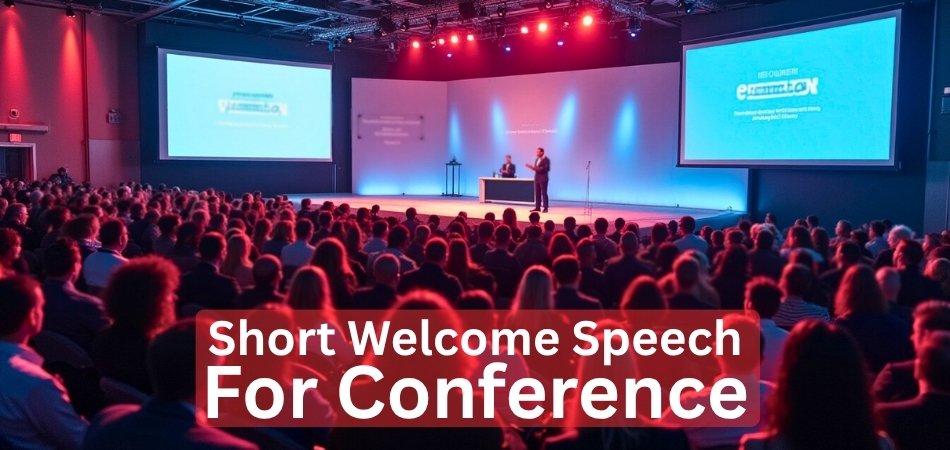Greeting people at the beginning of a conference plays an essential role. It immediately sets the mood and makes everyone feel welcome. If you’re someone who has to speak at the beginning, you might be thinking about how to give a short welcome speech at a conference that feels just right.
A short welcome speech for a conference should begin with a warm greeting to the audience. Then, introduce yourself clearly and mention the event’s name or theme. Welcome all guests kindly and share the main purpose of the event in simple words. End with a thank you and a positive note.
Want to know more about how to put all these parts together in a simple and clear way? Keep reading because this article has all the steps you need to make your welcome speech great.
Short Welcome Speech for Conference
Good welcome speeches make everyone feel comfortable and excited when you start a conference. You don’t have to speak for long, but a clear structure helps you speak with confidence. Here’s a simple step-by-step to help you get started and make your speech better.

Step 1: Greet the Audience
Begin with a warm and friendly greeting. A simple “Good morning” or “Hello, everyone” works well. This makes people feel noticed and comfortable right away. Try to smile and sound happy when you speak. It sets a nice mood for everything that comes after.
Step 2: Say Who You Are
Next, introduce yourself in a short sentence. You don’t need to tell your full life story—just your name and maybe what role you have in the event. This helps the audience know who’s talking. Keep it short and clear so it doesn’t take too long. This part shows confidence and helps build a connection.
Step 3: Mention the Event
Now, talk briefly about the event itself. Say what kind of conference it is or what it’s about. You can say what kind of conference it is, like one of the upcoming conferences in Canada that focus on topics such as science or technology. This makes the audience feel like they’re part of something important. Try to sound positive and cheerful.
Step 4: Welcome the Guests
Take a moment to welcome everyone who came. This can include speakers, organizers, and the audience. Make sure to sound respectful and thankful. A nice welcome makes people feel appreciated. It also shows that you care about everyone there.
Step 5: Share the Purpose
Tell the audience why the event is happening. Try to keep it short and simple. You can say what the event hopes to talk about or what the goal is. This gives people a clear idea of what to expect. It also helps them get more interested.
Step 6: Keep It Short
A welcome speech doesn’t need to be long. Just a few minutes is enough. Say what’s important and leave out extra details. People will enjoy it more if it’s short and sweet. Always end before the audience starts losing interest.
Step 7: Add a Thank You
Before you end, say thank you to the people who helped make the event happen. You can also thank the guests for coming. This small step shows kindness and respect. Everyone likes to feel thanked. It adds a nice finishing touch to your words.
Step 8: End with Positivity
Close your speech on a happy note. You can wish the audience a great time at the event. Try to end with a smile and a confident tone. A good ending helps people remember your words. It also sets a good vibe for the rest of the event.
Common Mistakes to Avoid When Structuring a Short Welcome Speech for Conference
Even a short welcome speech can go wrong if not planned the right way. Small mistakes can make the speech feel confusing, boring, or too long. Knowing what to avoid can help you sound clear and confident. Let’s look at some things you should be careful about in your speech.
Too Much Talking
One big mistake is making the speech too long. People might lose interest if it goes on and on. For example, opening lines for educational conferences should be short, clear, and welcoming so the audience stays engaged right from the start. A welcome speech should say what is needed and move on. This helps the event begin on a good note.
Skipping the Greeting
Some people forget to greet the audience at the beginning. This makes the speech feel cold or rushed. A simple greeting like “Good morning” helps start things the right way. It shows you respect the people listening. Don’t miss this important step.
No Clear Purpose
If you don’t say why the event is happening, the audience may get confused. A short sentence about the goal of the event makes things clearer. It helps everyone understand what the day is about. This also makes the speech more meaningful.
Forgetting to Thank
It’s easy to forget to thank the right people. Always thank the guests, speakers, and organizers. Even a quick thank-you shows that you care. It leaves a good feeling with everyone. Skipping this part can make the speech feel incomplete.
Speaking Too Fast
When you talk too fast, people may not understand what you’re saying. You might also sound nervous. Try to speak at a normal pace with short pauses. This helps people follow your words better. It also makes you sound calmer and sure.
Ending Without a Smile
Finishing the speech in a dull or flat tone is not a good idea. A welcome speech should end on a happy note. Say something nice and smile when you finish. This makes people feel good and ready for the event. Always close with a friendly tone.
Short Welcome Speech Templates for Conferences to Help You Get Started
Starting a conference with the right words sets the tone for the entire event. Whether you’re aiming for formal, friendly, or inspiring, your welcome speech can make a lasting impression. Below are some ready-to-use templates to help you get started with ease.
1. Formal and Professional
Good morning distinguished guests, respected colleagues, and esteemed delegates,
It is my great honor to welcome you all to this year’s ____________ Conference. Your presence shows a shared commitment to excellence and progress in our field.
This event brings together minds from different backgrounds, all working toward shared goals. Throughout the conference, we will explore new ideas, valuable insights, and meaningful discussions that matter.
Let’s make the most of our time together. Thank you for being here, and I wish you a productive and inspiring conference.
2. Warm and Engaging
Good morning everyone,
It’s a real pleasure to see all of you here today at our ____________ Conference. It’s always exciting to gather with people who share the same passion and goals.
This is more than a formal event—it’s a time to meet, learn, and grow together. Whether you’re speaking, listening, or connecting with others, we hope you leave with new energy and fresh ideas.
We’re happy you’re here. Welcome, and let’s enjoy every moment of this conference.
3. Student-Friendly and Inclusive
Hello and welcome everyone,
It’s wonderful to have such a mix of students, professionals, and leaders gathered in one place for the ____________ Conference. We all bring something important to the table.
This is a space where questions are welcome, learning is constant, and everyone belongs. Whether it’s your first conference or your tenth, we’re glad you’re here.
So take part, speak up, and enjoy the day. Let’s get started!
4. Inspirational and Vision-Driven
Good morning respected guests and valued professionals,
It’s an honor to welcome such a passionate and hardworking group to the ____________ Conference. You each play a part in creating real change every day.
This event is not only about learning—it’s about dreaming bigger, thinking forward, and inspiring one another. Let’s use this time to reflect, connect, and build something meaningful together.
Thank you for being here. Welcome to a day full of purpose and inspiration.
5. Collaborative and Peer-Centered
Welcome, dear colleagues and fellow experts,
It’s a true honor to stand among people who understand the challenges and rewards of our work. The ____________ Conference gives us a chance to share openly, support each other, and grow together.
We come from many places, but we’re here for the same reason—to improve, to connect, and to learn. This is your space to ask, listen, and contribute.
Thank you for being part of it. Let’s make every moment of this conference count.
How Can You Calm Nerves Before Speaking?
Feeling nervous before speaking in front of people is very common. It happens to many, even those who speak often. But there are ways to feel better and more relaxed before going on stage. Here are some tips that can help you feel calmer:
Take Deep Breaths
Breathing slowly can really help when you’re feeling nervous. Try to take a deep breath in, hold it for a few seconds, and let it out slowly. Do this a few times before you speak. It helps your body feel more relaxed. It also gives your mind a moment to settle down.
Practice Out Loud
Saying your speech out loud before the event can make a big difference. You can do it in front of a mirror or ask someone to listen. Reading from a conference welcome speech sample can help you understand the flow and tone better. The more you say the words, the more comfortable you’ll feel. It also helps you find and fix any tricky parts.
Think Positive Thoughts
Sometimes, we get nervous because we think something will go wrong. Try to change those thoughts into good ones. Tell yourself, “I can do this,” or “I’m ready for this.” These small words can make a big impact. Positive thinking helps you feel stronger inside.
Arrive a Bit Early
Getting to the place early gives you time to settle in. You can look around, meet a few people, and get used to the space. This helps you feel less like a stranger when you speak. It also gives you time to relax before things begin.
Smile and Stand Tall
Smiling makes you look friendly and feel better as well. Standing up straight helps you feel more confident. Even if you’re nervous inside, your body can help trick your brain. A strong body posture can calm your nerves. It also makes you look sure of yourself.
Don’t Aim for Perfect
It’s okay if you make a small mistake. Most people won’t even notice. Try not to think too much about being perfect. Just focus on sharing your message clearly. Being real and honest matters more than being perfect.
What If You Forget Your Conference Welcome Speech Midway?
During a speech, forgetting what you were going to say can be stressful. Your heart might beat fast, and your mind might go blank. This happens to many people, even experienced speakers. Don’t worry—there are simple ways to handle it and still do great.
Stay Calm First
The most important thing is to stay calm. Take a deep breath and give yourself a second to think. The audience understands that small mistakes happen. When you stay calm, your mind starts working better again. Feeling calm helps you move on smoothly.
Pause and Smile
A short pause with a smile can work like magic. It gives your brain time to catch up. The audience often won’t even notice anything went wrong. Smiling also keeps you looking confident. It shows you’re still in control of your speech.
Use Simple Notes
Having a few small notes can really help during your speech. They should only include short points, not full sentences. You can glance at them quickly when needed. This helps you remember the next part without feeling stuck. It also keeps your speech natural.
Start From the Last Line
Sometimes, saying the last thing you remember helps bring the next part back. It gives your brain a little push. Even just repeating a phrase can help you move forward. This trick works well when your mind suddenly goes blank. It keeps the speech flowing.
Say It Freely
Try saying your message in your own words if you can’t recall the exact line. The meaning is what matters most. People will listen as long as you sound honest and clear. Don’t worry about being perfect. Speaking naturally is often even better.
Don’t Apologize Too Much
Saying “sorry” once is fine, but repeating it too much can make things worse. Just smile and continue like nothing happened. The audience is usually kind and won’t mind small mistakes. Confidence comes from moving forward without stressing over little slips.
Essential Tips to Turn a Short Speech into a Lasting Impression
A short speech doesn’t mean it has to be forgettable. With the right approach, your words can stay in people’s minds. Let’s look at how a few simple tips can make your speech powerful and memorable.
- Begin with Impact: A strong opening grabs attention and sets the mood quickly. Use a short quote or powerful line to hook listeners instantly.
- Speak with Clarity: Clear words make it easier for the audience to understand your point. Avoid long sentences that can confuse or bore people.
- Use Real Emotion: Let your feelings show naturally while you speak. People connect more when they feel the speaker truly means their words.
- Add a Personal Touch: Sharing a short personal moment makes your speech feel real. It helps people relate to you and remember your message.
- Keep It Focused: Stick to one main idea and build around it. Too many points can make even a short speech feel messy or unclear.
- Use Simple Words: Don’t try to sound too smart with big words. Simple, everyday language reaches people faster and leaves a better impact.
- Make Eye Contact: Looking at your audience makes them feel included. It also shows you’re confident and interested in sharing your message.
- Close with Strength: End your speech with a line that’s easy to remember. A strong finish gives your words a lasting place in minds.
Frequently Asked Questions
Welcome speeches may seem simple, but many people have questions when they’re asked to deliver one. To help you feel more prepared and confident, here are answers to some of the most common questions people have about giving a short welcome speech at a conference.
How Early Should You Prepare Your Conference Welcome Speech?
It’s best to prepare your conference welcome speech at least one week before the conference. This gives you time to organize your thoughts, practice, and make changes if needed. Starting early also helps you feel less stressed and more confident on the actual day.
Can Humor Be Used in a Short Welcome Speech?
Yes, light humor can be used, but it should be appropriate and gentle. Avoid jokes that may confuse or offend people. A simple, harmless comment or funny observation can help the audience relax and feel more connected to you.
What’s the Ideal Tone for a Conference Welcome Speech?
The tone should be friendly, respectful, and welcoming. It’s okay to sound cheerful and warm, but stay polite and professional. The goal is to make everyone feel included and valued right from the start of the event.
Should You Mention the Location in the Speech?
You can mention the location, especially if the venue is special or well-known. Saying something like “It’s great to welcome you here at [venue name]” helps set the scene. Just keep it brief and relevant to the event.
How Do You Greet a Mixed Audience?
Use general and respectful greetings like “Good morning, everyone,” or “Hello, distinguished guests and friends.” This covers all kinds of people without missing anyone. It also sounds warm and respectful to the entire audience.
Is It Okay to Use a Quote in the Speech?
Yes, using a short quote can be a great way to open or close your speech. Choose something that fits the theme of the event. Make sure it’s simple, easy to understand, and not too long for a short welcome speech.
How Do You Keep the Speech Short Without Missing Key Points?
Focus only on the most important parts, such as greeting, introduction, event name, welcome message, and a thank-you. Skip long stories or details. A simple and clear message usually works better than something that tries to say too much.
Conclusion
A great speech doesn’t have to be long to be remembered. It just needs to feel real, warm, and thoughtful. Whether you’re speaking to experts or first-time attendees, your words at the beginning set the mood for the whole event.
By using a simple structure, adding a personal touch, and speaking with confidence, you can turn even a few minutes into something meaningful. Any welcome speech for a conference works best when it’s clear, calm, and makes everyone feel included and appreciated. Little things like smiling, speaking slowly, and ending on a high note can leave a lasting impact.
So, take a deep breath, believe in your message, and go for it. Your words have the power to start something great. And remember, a short welcome speech for conference can open the door to big ideas.







